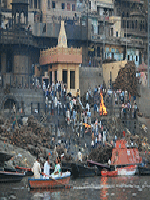
Manikarnika Ghat has a great significance not only in Hindu mythology and way of life but also in the philosophies of life and death. Manikarnika is basically a cremation Ghat. It is interesting to know that cremation Ghats are usually placed outside the main town, as they are considered inauspicious. Nevertheless this doesn’t stand true in the case of Varanasi where Manikarnika is situated quite in the middle of town itself.
This is precisely because the entire city of Varanasi is considered a “Maha-Shmashan” or the Great Cremation Ground.Manikarnika Ghat is perpetually crowded with funeral parties. You will find shops lined up with things used during the cremation such as Ghee, wood, offerings and clothes. These cremations are felicitated by Doms who are considered the guardian of dead. Seeing bodies being cremated so publicly has always exerted a great fascination for foreign visitors to the city who find it utterly amusing and deviated from the one practiced in Semitic religions. It is worthy to note that photography is strictly considered a taboo. So please avoid doing that as this might be seen as a provocation and act of hostility and might lead to unwanted troubles. The philosophical aspect of Manikarnika lies in the fact that this Ghat is an optimal amalgamation of both life as well as death. Manikarnika that lies at the center of the Panch-Tirtha symbolizes both creation and destruction, epitomized by the juxtaposition of the sacred well of Manikarnika Kund and Manikarnika Ghat. While Vishnu has dug the former at the time of creation of earth Shiva, the destructor, inhabits the hot and sandy ash-infused soil of the later. Manikarnika Kund is considered to be even older than Ganges and as legend has it, Vishnu cared the kund with his discus, and filled it with perspiration from his exertions in creating the world, at the behest of Shiva. When Shiva quivered with delighted, his earning fell into this pool, which as Manikarnika – “Jeweled Earring” – became the very First Tirtha in the world.